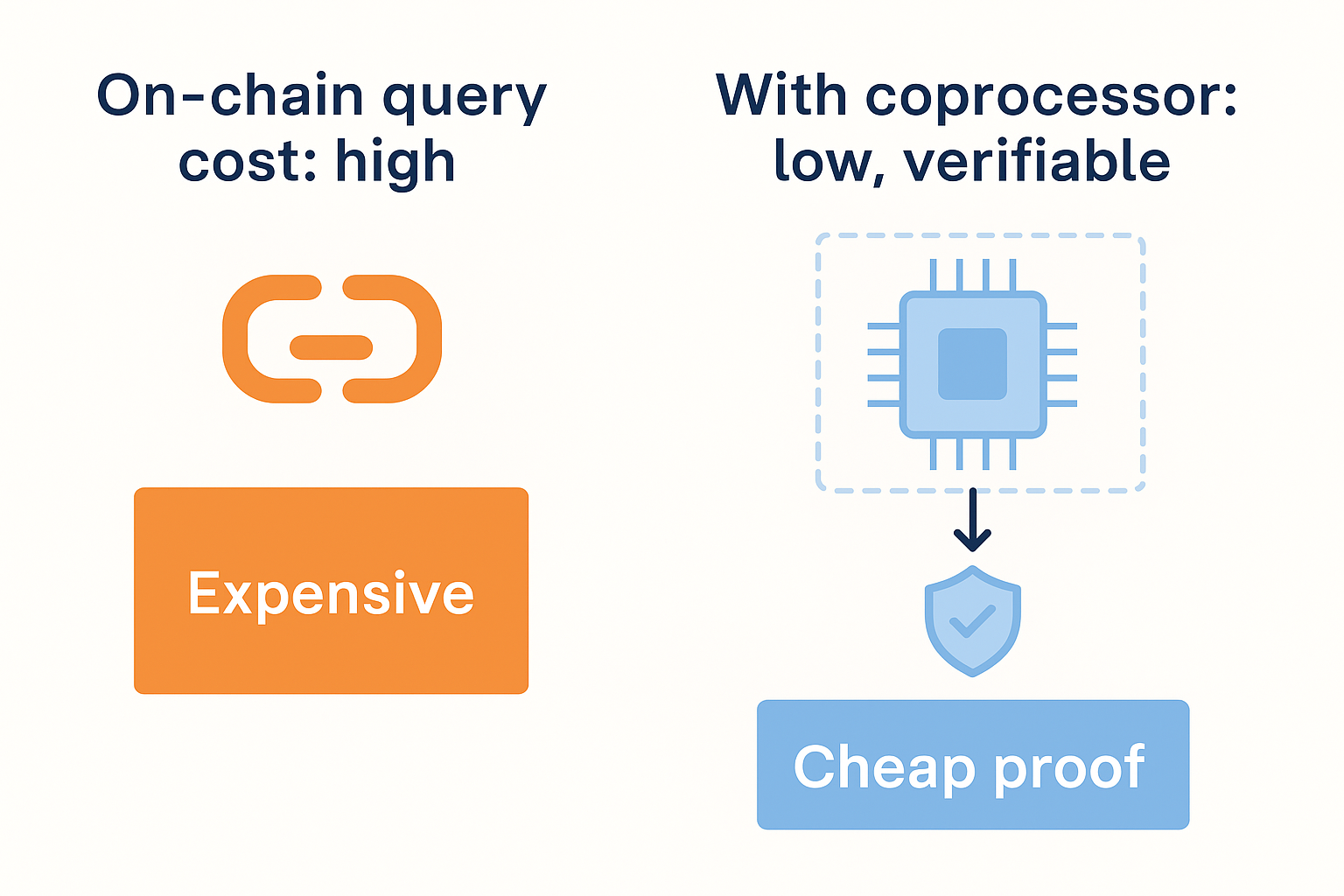Real‑World Applications
Zero‑Knowledge Coprocessors (ZK Coprocessors) have moved beyond theoretical cryptography into practical deployments. Their ability to execute complex computations off‑chain and provide verifiable proofs opens new opportunities across decentralized finance, data analytics, privacy‑focused compliance, and even artificial intelligence. This module explores these applications in detail, showing how coprocessors extend blockchain capabilities and enable functions that were previously infeasible or cost‑prohibitive.
Verifiable Data Queries

One of the most immediate use cases for ZK Coprocessors is verifiable data analytics. Traditional smart contracts are ill‑suited for processing large datasets because every computation must occur within the blockchain’s execution environment, constrained by gas fees and block limits. Coprocessors address this by performing queries off‑chain and generating succinct proofs that the results are accurate.
For example, a decentralized exchange might need to analyze historical price data across thousands of blocks to calculate risk metrics. Executing this directly on‑chain would be prohibitively expensive. With a coprocessor, the exchange can run the computation off‑chain and provide a zero‑knowledge proof that the result, such as a 30‑day moving average, is correct and derived from authentic chain data. This reduces computational overhead while preserving trust, allowing advanced analytics to feed into on‑chain decisions without centralized intermediaries.
DeFi and Financial Use Cases
Decentralized finance (DeFi) protocols are early adopters of ZK Coprocessors because they require both scalability and trust minimization. In lending markets, for instance, assessing a borrower’s creditworthiness may involve analyzing on‑chain transaction history or off‑chain credit data. A coprocessor can perform this analysis privately and produce a proof that the borrower meets the required criteria without revealing sensitive details.
Another area is collateral verification. Stablecoins and synthetic assets often rely on external reserves that need to be auditable yet private. ZK Coprocessors enable these audits by proving reserve adequacy without exposing raw financial data. This approach aligns with increasing regulatory scrutiny while maintaining user confidentiality, a balance that purely public blockchains cannot achieve.
Protocols also use coprocessors to verify interest rate calculations, insurance payouts, or complex derivatives pricing. By moving these computations off‑chain, projects can deliver sophisticated financial products without incurring prohibitive on‑chain costs.
AI and Privacy‑Preserving Computation
Artificial intelligence and machine learning are resource‑intensive processes that cannot realistically be executed within smart contracts. However, integrating AI outputs into blockchain applications is increasingly valuable, especially when those outputs must be trusted without revealing underlying models or data.
ZK Coprocessors bridge this gap by proving that a model was executed correctly without exposing the model’s parameters or training data. For example, a decentralized medical application could use an off‑chain AI model to analyze health records and then provide a proof to a blockchain‑based insurance platform that the analysis meets eligibility criteria, without disclosing private medical information. This extends the reach of zero‑knowledge technology from financial transparency to data privacy in sensitive industries.
Privacy‑Preserving Compliance
Regulatory compliance is a growing concern in blockchain ecosystems, particularly as institutions enter decentralized markets. Know‑Your‑Customer (KYC) and Anti‑Money Laundering (AML) checks are often mandatory but conflict with the ethos of open, permissionless systems. ZK Coprocessors offer a compromise by enabling zk‑KYC: proving that a user has passed identity verification without revealing personal details on‑chain.
This capability is valuable in token sales, institutional DeFi, and cross‑border payments. Instead of exposing user documents or sensitive attributes, a coprocessor generates a zero‑knowledge proof confirming compliance with regulatory requirements. The blockchain only verifies the proof, reducing the risk of data breaches while satisfying legal obligations. This model aligns with emerging privacy‑preserving frameworks and is being explored by multiple regulatory sandboxes worldwide.
Cross‑Chain and Rollup Communication
Interoperability remains one of the most pressing challenges in blockchain infrastructure. Most bridges today rely on trusted validators or multisignature schemes, which have historically been frequent targets for exploits. ZK Coprocessors enable a trust‑minimized alternative: cross‑chain proofs.
A coprocessor can verify that an event or state exists on one chain and prove its validity to another chain without requiring direct communication between them. This is especially powerful for rollups and modular blockchains, where assets and data need to move freely without introducing additional trust assumptions. For example, a liquidity protocol on Ethereum can confirm collateral balances on a zk‑rollup without relying on a centralized bridge operator, improving both security and composability.
Cross‑chain verification also supports advanced use cases like unified identity systems, cross‑rollup DeFi strategies, and seamless user experiences across multiple ecosystems. By serving as neutral verification layers, ZK Coprocessors reduce fragmentation and pave the way for a more connected blockchain landscape.





